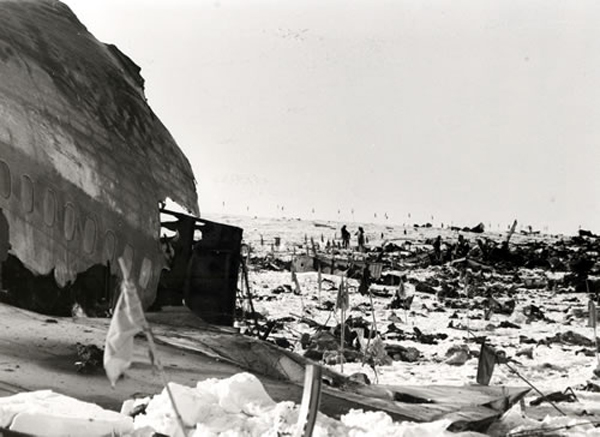
[Three ideas summarise the] emotional fallout from Erebus: Truth, Justice, and Reconciliation. At any phase of the long, complex, torturous, and tortured tale that is Erebus these concepts feature prominently.
Brett Christmas, son of Air NZ Flight TE901 passenger, Frank Christmas
Using this page
Teachers can use the Erebus accident and its aftermath to explore ideas around what we remember of people and events from our past, and how we remember them. We can also ask how we address historic human injustice and the role of apologies in facilitating processes of historical reconciliation.
Teaching sensitive content
This topic examines content associated with themes of death and grief. It is confronting and may be unsuitable for younger year levels. Teaching sensitive subject matter can present risks to students but can also be highly relevant to discussions around historical significance and empathy.
We recommend teachers familiarise themselves with the content of this topic. See the recommended sources listed below.
Curriculum
Teachers
This page supports an integrated approach to teaching the big ideas of Aotearoa New Zealand histories – Understand | Know | Do.
Aotearoa New Zealand's Histories – Ministry of Education (PDF, 508KB)
Students
The Erebus accident provides a meaningful context for inquiry at all levels of NCEA history and tourism. There are ample primary and secondary sources to explore a range of research topics connected with this event, including the causes of the crash, its consequences for New Zealand and New Zealanders, and the impact and challenges of Antarctic tourism in the past and in the future.
NCEA Education | History – Ministry of Education
NCEA Education | Tourism – Ministry of Education
Key concepts
Key concepts and ideas related to the curriculum include:
- Identifying and exploring historical relationships
- Identifying sources and perspectives/points of view
- Historical memory and memorialisation
- Historical reconciliation
- Values and justice
- Interpreting past experiences, decisions, and actions
- Use of power.
Learning guides
The five teaching guides below can help unpack these big ideas in relation to the Erebus accident.
New Zealand’s relationship with Antarctica
The frozen continent has long fascinated New Zealanders. Many of those who took tourist flights in the 1970s, like the explorers and scientists before them, were motivated by a sense of adventure.
Erebus and historical significance
Outside of war, the Erebus accident is the greatest recorded loss of life in our history in a single civilian event or disaster. At the time it was the fourth worst aviation accident in the world. Its impact reverberated widely for years.
Historical empathy is the ability to see and understand events from the point of view of those who experienced them first-hand. It allows us to appreciate the feelings, thoughts, or attitudes of another person.
Erebus and memorials to history
Memorials and monuments to the past can reinforce community and group identity. As sites of memory, they can provide people with a place to gather and express a shared knowledge of the past on which a group’s sense of unity and distinctiveness is based.
Erebus and historical reconciliation
In 2019, Prime Minister Jacinda Ardern formally apologised to the families of those killed on Erebus. Can historical apologies facilitate a process of historical reconciliation?
Steve Watters, Senior Educator–Historian

Community contributions